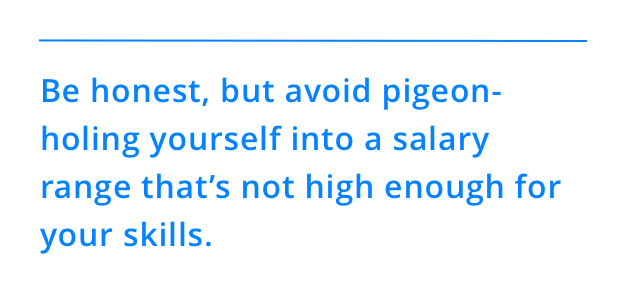No one really likes to talk about money, especially in a job interview. It’s no surprise then, that “what’s your expected salary?” is one of the most awkward questions to be asked by a recruiter or hiring manager. Whether you encounter this on a job application or it pops up during the interview process, learn more about how this question affects hiring and the best way to approach your answer about salary expectations.
What Interviewers Want to Know
Most recruiters or hiring managers ask job seekers this interview question because they need to know if you’ll fit into their budget. While there is usually a little wiggle room, answering incorrectly could disqualify you from the candidacy.
If the employer believes you will cost too much, they may assume you would be dissatisfied and uncommitted to a job with them, even if you settle for their lower pay. If you don’t put enough value on your position, the interviewer could assume that you aren’t the best in your field, or you’re trying to get a job that’s out of your league.
What to Put for the Desired Salary on Job Applications
There are two places you’re likely to encounter the salary expectations dilemma, but first, you must learn how to answer the desired salary question on an application. Let’s take a look at the options:
- You could choose to skip it altogether, but many job application sites may have this as a required question. Not answering it could prevent your application from being submitted.
- You put a salary amount that’s on the low end for the position or your region’s cost of living and get hired, but at a much lower rate than you want or deserve. This could also create the appearance that you aren’t proud of your work and don’t consider yourself an expert.
- Too high of a salary causes you to appear greedy, out-of-touch, or dissatisfied with what they may consider a lower-paying position. If you overshoot this number, you likely won’t get a raise from what you had before and you may just not hear back from the hiring manager with a job offer.
- The best option is to list a salary range, if possible. Do a little research online to find out what a low and high number would be for the job title at a variety of experience levels. Sites like Payscale.com, Salary.com, Glassdoor.com and Indeed.com can all help here. Be sure to clarify if your salary number is per month or per year. Be careful to read the wording so you don’t answer with a number that doesn’t fit the context of the question.
- You may also try to write a phrase to hint that you want to discuss salary expectations in person. A simple “negotiable” will do.
How to Answer “What is Your Desired Salary” in Job Interviews
Answering this interview question in person can seem challenging because you may feel put on the spot. However, you have to expect that it will come up, so it’s important to be prepared with research to back up your request. Here are some answer examples for how to respond to questions about salary expectations.
Example 1:
I have years of experience as a sales professional and have won several awards for breaking goals at my past job. I am flexible in exploring a salary that acknowledges both my work history and the demands of the position.
This response acknowledges that you are both qualified for the job and flexible about the possible compensation package.
Example 2:
I appreciate that you want to hear my thoughts on compensation. Once I know a little more about what is required, I can answer that more honestly. In the meantime, I have seen other companies pay between $X and $Y for the same job title.
This response reveals that you still need to know more about the job before coming to any decision and that you expect them to reveal more about both job expectations and pay. It also tells them that you can do research and won’t be underpaid.
Example 3:
I believe we can come to a fair agreement on what someone with my background and experience should be paid. Based on what I made before, along with my research on similar positions, I feel that $X to $Y would make a good starting point for our discussions.
This response gives the employer a suitable range that you believe is fair but also lets them know that you are open to negotiations. It’s a firm but gracious reply.
Why This is a Difficult Question

It’s also a difficult question because your annual salary is just one element of your total compensation package. Benefits, perks, retirement options, paid time off, starting salaries with regular bonuses — they all play a role in your compensation. Ask clear questions about the total package to better understand how your salary could fit into the bigger picture.
What Not to Say About Desired Salary Questions
Sometimes, the best answer is in what you don’t say. Avoid these reactions when asked about your expectations, your current salary, or history during a salary negotiation or discussion:
- A specific salary. If you must give a specific number, share a range. Better yet, explain your salary requirements in industry terms, without numbers, such as “entry-level” or “senior-level.”
- Wishful thinking. We all want to make more money than we do now. Don’t overprice your next job, however. Any fibbing could catch up to you during a background check.
- Shock or dismay. Once you learn what the salary is for a position, try to temper your disappointment if it doesn’t line up with your expectations. Always appear grateful for the chance to interview; you never know if a higher-paying opportunity with the same company could come up down the road or if the employer is open to counter offers if a job offer comes around.
Tips to Give the Best Answers
You may not know how best to answer the salary expectations question during your job search until you have to put your answer into practice in an interview. Focus on highlighting your skills while reinforcing that you’re flexible. Share salary information that you would be happy to receive, and be sure you show professionalism throughout the interview, even if the numbers you hear in return are disappointing.






























